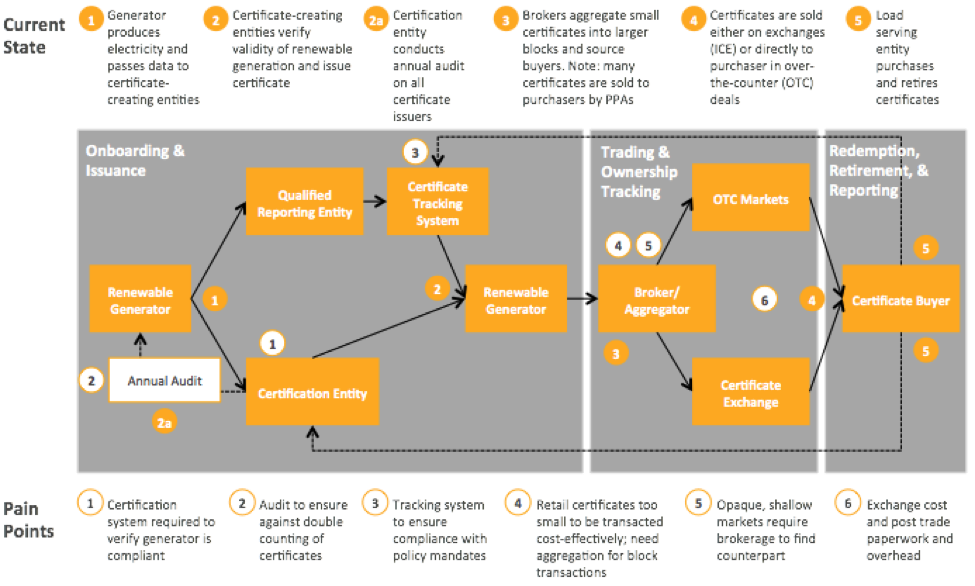
Blockchain Is Reimagining the Rules of the Game in the Energy Sector
Through the Energy Web Foundation, RMI is supporting the commercial implementation of blockchain applications that promote investments in clean, secure, and reliable electricity systems worldwide.
Blockchain technology—the technology underpinning the Bitcoin virtual currency— has the potential to accelerate the transition to the clean energy future that Rocky Mountain Institute (RMI) has been focused on since the organization’s inception. Specifically, we believe blockchain technology has the potential to redesign the rules of the game on how energy is distributed and transacted.
Energy Web Foundation (EWF)—a global nonprofit organization founded by RMI and Grid Singularity—is focused on capturing this potential. Currently, EWF is building an open-source blockchain infrastructure to serve as the standard industry platform for blockchain applications in the energy sector to accelerate the deployment of renewables and distributed energy resources (DERs).
A platform like the one being built by EWF will be defined by the applications it actually supports. As blockchain soars to new heights of hype there’s a critical need for the value of the technology to be established in major industries. Accordingly, EWF, in addition to building a blockchain infrastructure for the energy sector, is working with its affiliate companies to implement projects at scale that clearly demonstrate the value of the technology.
Where to Start?
EWF has filtered through a wide range of roughly 200 energy-specific blockchain applications being explored by organizations across the globe to create a shortlist of 12 unique blockchain application domains (i.e., a set of specific commercial applications targeting a similar process or market in the energy sector) with an estimated market size of at least $1 billion per year. At EWF’s May 2016 kick-off workshop in Windsor, UK, affiliate companies prioritized four blockchain application domains from that shortlist:
- Utility Billing: Any blockchain application where utilities and third parties use cryptographic identities to manage metering, customer settlement, advanced rate implementation, or customer switching
- Certificates of origin: Any blockchain application where renewable energy generators and certificate buyers interact directly and use smart contracts to streamline the overall process through the automation of certificate issuance, tracking, and retirement
- Demand response: Any blockchain application where demand response aggregators (i.e., utilities and third parties) use secure smart contracts to conduct aggregation, real-time measurement and verification (M&V), settlement, and trading for energy efficiency and demand response programs
- Transactive energy: Any blockchain application where devices automatically respond to local conditions on the distribution grid in real time, engaging in two-way price negotiation based on a combination of user preferences and grid needs
EWF formed affiliate taskforces focused on each application domain to test the value of blockchain within the domain, and where value is identified, deliver a foundation for commercial applications. Taskforces are unpacking the challenges in existing systems, identifying how blockchains can overcome those challenges, building a technical architecture for blockchain-based applications, and, critically, accelerating the implementation of commercial projects in the real world.
Over time, EWF will likely continue to explore other shortlisted application domains—such as the management of electric vehicle batteries and charging infrastructure, supply chain tracking for utilities, and wholesale market settlement—where blockchain can lower costs, enhance privacy and security, and create new revenue streams.
Using Blockchain to Tackle Existing Pain Points, Generate Value, and Reshape the Energy Sector
EWF believes that blockchain technology offers solutions to challenges associated with utility billing, certificates of origin, demand response, and transactive energy—along with other application domains in the energy sector—that present unnecessary costs and limit the growth of clean energy markets.
As an example, consider the markets for “certificates of origin,” also referred to as renewable energy certificates (RECs) or guarantees of origin (GOs). Currently, various limitations and flaws constrain the full potential of these markets—ultimately constraining investments in renewable energy. Major pain points include the presence of many administrative steps (from a given certificate’s issuance, through aggregation and sale, to the final claim and retirement); the high transaction costs associated with each of these steps, including fees paid to auditors and brokers (typically translating to 5 percent of a certificate’s value); the risk of “double-counting” (i.e., the green attributes of a given certificate claimed more than once); and inconsistencies across markets, which complicate the reporting of buyers who operate in more than one geography.
EWF expects that blockchain technology can streamline and enhance certificates of origin markets—recreating these markets so they become more secure, robust, lower cost, and integrated, and, in turn, enabling an increase in participation worldwide of renewable generators and certificate buyers of varying sizes:
- Blockchains with smart contracts could radically simplify and lower the cost for certificate of origin systems by enabling renewable energy generators and certificate buyers to interact directly using smart contracts—a string of code, shared between participants, that executes an action when a set of predetermined conditions are met—to streamline the overall process through the automation of certificate issuance, tracking, and retirement. This peer-to-peer trading system would also improve the process by enabling real-time settlement, eliminating the need for intermediaries and related process steps, lowering internal administration and auditing costs, and increasing confidence in the traceability of renewable energy generation.
- The “immutability” of data on a blockchain-based system makes data difficult to tamper with due to a combination of strong cryptography, the interdependent relationship between each block of data, and distributed consensus. Also, smart contracts can eliminate the risk of double-counting by automating certificate retirement and making retirement “events” public in real time.
- An open-source, global blockchain infrastructure will help encourage standardization across geographies. This would help enable frictionless buying and selling of certificates of origin globally—enabling the market participation of many more renewable generators and buyers, especially ones currently shut out of the market due to the high transaction costs and complications associated with participation.
Blockchain can convert a market that is today overly complicated and costly into something that is more elegant and efficient as represented, respectively, in Figures 1 and 2 below.


Blockchain delivers comparable solutions to existing challenges in utility billing and demand response that would streamline and enhance their functioning—the subject of future blog posts.
In order to prove this value and progress toward EWF’s larger goal of deploying a blockchain-based certificates of origin system in several voluntary markets, the certificates of origin taskforce will be implementing projects over the coming months focused on the following:
- Issuing certificates of origin from existing renewable generation assets in an affiliate’s service area, and aggregating them in a blockchain-based registry on EWF’s test network
- Connecting data from an existing certificates of origin database to EWF’s blockchain test network, and facilitating the development of market-facing applications on top of it (e.g., for certificates trading and tracking)
- Securing participation of prominent global corporate certificate buyers for market demonstrations
Crafting a New Global Standard for Value Creation in the Energy Sector
EWF will share updates and additional insights over the coming months about our work to develop blockchain solutions across application domains and prepare the core blockchain infrastructure for a wide range of energy sector applications.
In the meantime, companies interested in joining the growing list of EWF affiliates from across the globe and driving the creation of the blockchain platform for the energy sector should send an email to contact@energyweb.org. We also encourage startups, technology providers, and research institutions interested in joining our ecosystem and being in-the-know about developing commercial decentralized applications (“dApps”) for the energy sector that plug into EWF’s blockchain to contact us here.
Image courtesy of iStock.